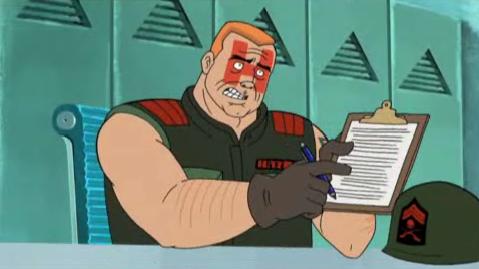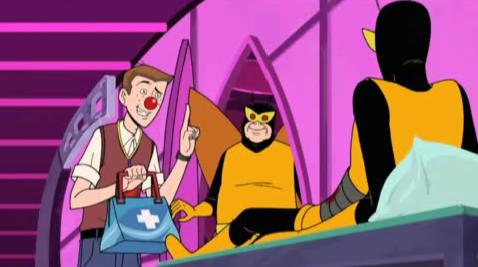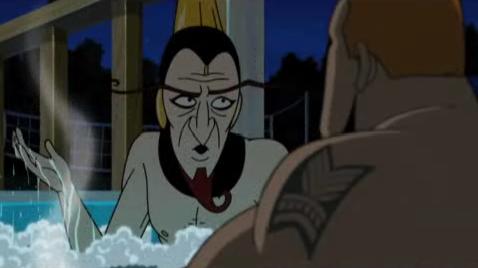The Venture Bros.:
Home is Where the Hate Is
Season three trundles along with an episode that brings Sergeant Hatred (a very minor--but memorable--character from season two) properly into the Venture fold. He's even given the supreme honor of being crowned Dr. Venture's new arch-enemy. This is definitely a welcome development as Hatred is shaping up to be the important secondary villain for the show that Baron Underbheit never quite managed to be. Unfortunately the episode itself--while good--is the first one of the season that isn't great.
 |
Now let's go through this one piece by piece, because I was so confused by my initial response to the episode that I had to watch it again to decide whether or not I liked it.
For starters, this episode seems to give an ultimate shape to the season that is to come. And, honestly, this happens not a moment too soon. Out of the previous three episodes two of them cast an eye backward and the other one spent the whole time jogging in place. This is episode four and our first taste of forward momentum. Some relationships are changing, and others are struggling. The Monarch is frustrated both by his inability to arch Dr. Venture and his continuing discomfort with Dr. Girlfriend's sexual history. And Sergeant Hatred comes along to cause him even more misery by usurping arching rights to Venture...whom he intends to treat like a king.
Ah, okay. So now we kind of see where the story is going. This episode (as was pointed out by the person with whom I watched it) was necessary. And yet the content just seemed a bit...unsteady. Having rewatched the episode I think I'm able to pinpoint where these feelings of mild dissatisfaction are coming from.
The entire opening sequence with Hatred arriving at the Venture compound and introducing himself as new arch rival is just...well, it's perfect. It's absolutely everything The Venture Bros. should be. It's hilarious, mundane, preposterous, brilliantly scripted and flawlessly acted. It's a classic sequence...everything the Manhowers sequence from The Doctor is Sin should have been.
 |
I should take a moment here to commend Jackson Publick on his portrayal of Hatred. Brendon Small (of Home Movies and Metalocalypse fame) was unable to reprise the role for season three. Initially I had misgivings about the recast, no matter how necessary it obviously was. But Publick manages to infuse Hatred with a perfect seething throatiness that keeps every line of the character thick with an aural snarl. And yet--exactly as Publick managed from the start with The Monarch--Sergeant Hatred is endearing. He really comes across as somebody's big rough-housing uncle...sure, he could pull you limb from limb, but he loves ya, little guy. (The fact that Hatred manages to be even somewhat likeable after we are reminded that he's a convicted pedophile is a feat that only Hammer and Publick could pull off this well.)
Hatred is played as a sort of doddering old bumpkin who flits between burning an ominous H around Hank and Dean with a laser cannon to getting excited by the lushness of Dr. Venture's lawn. He's an adorable brute, and his idea of a good joke is to shoot Dr. Venture in the stomach with a handgun. (A top ten Venture moment if ever there was one...) Hatred has a lot to live up to, after all. Venture fans were raised by the show's creators to be picky, and in addition to interviewing with Dr. Venture, he also spends the first section of the episode interviewing for our acceptance, as an audience.
It's not an easy thing to shift the focus of a show from one major character to another, but the rise of Hatred is handled very well here, and the welcome party that he throws for Dr. Venture (to celebrate their status as enemies) is, again, pure Venture gold--at least on the whole.
The party games are excellent and well-observed, Dr. Venture's irritatingly-repetitive turn in charades being a painfully funny highlight, and the brief scenes that take place in Hatred's other rooms (his pathetically personalized den area, for example, or the room into which Brock retires to watch a crossbow documentary on PBS) capture perfectly both the look and spirit of that vague sort of sad loneliness you experience in other people's homes...those times when the attempts at quiet coziness end up feeling coldly incorrect. Again...lovely, perfect, gorgeous stuff.
And yet--and yet--the episode features two significant misfires...namely the henchmen/moppet subplot, and the attempt on Dr. Venture's life. In the former, the only real highlight is Dean Venture's attempt at cheering up a wounded henchman 24, a la Patch Adams. Well, actually, there's another highlight involving dueling Pacman impersonations in a hedge maze. Pretty hilarious, actually.
 |
But otherwise, it's kind of underdeveloped, and by the time you get to the end you have to wonder at least a little why they bothered.
The other problem with the episode, involving a small explosive being affixed to Dr. Venture's spine, seems penciled in, and very weak. It went nowhere (unless you count a climactic fart joke as "somewhere") and actually didn't seem to make much sense. I guess the water in the hot tub caused it to fizzle out? Somewhere in that assassination plot there was a good ending waiting to be found. The problem is that it never was.
So what you have is an episode that started brilliantly, proceeded perfectly, and then got mired in two heavy-but-pointless energy-sappers at the end that make you almost question your enjoyment of what came before. With an ending that weak, it's hard to admit you could possibly have liked the episode that gave it to you.
But I did like the episode; it only seems weak because it ends on a wet bubbling fart instead of an explosion. And I look forward to seeing what comes next. It was a more than deserving entry in the continuing Venture saga, but it's also the first episode of the season that wasn't out-and-out great...and that's bound to be a natural disappointment.
![]()
Second Opinion
Jane Austen could have written this episode.
Well, no. No, she couldn't have. But it's the sort of thing she might have written about. Kind of. Give me a minute and I'll explain.
We all know that Jane Austen wrote about rich people doing rich things in rich places. Parties and to-dos took up a significant portion of her work. But perhaps what she was most interested in was the idea of social connection, something that Home is Where the Hate Is is all about. Okay, so people aren't trying their best to act within the boundaries of social niceties (take Sgt. Hatred's penchant for underage males, or The Monarch/Dr. Venture's lack of inhibition at displaying their "inheritance," as Rusty so bluntly put it), but the inherent themes of Jane Austen are clearly on display in this episode.
Still not convinced? Take the town of Malice itself; compare it to an estate from a Jane Austen novel...and then replace all the characters with supervillains...and then move the estate to a gated community in Middle America. But, you know, after you do all that the end result should look something like Malice. Maybe. If you squint a little.
How about the party that takes up the entire episode? What do you suppose the overarching theme is for those scenes? If you answered "Who is arching whom," then you are correct, and you win Sgt. Hatred's unending love and affection.
Sgt. Hatred is arching Dr. Venture, but what he's really doing is trying to torment The Monarch for robbing him blind all those years. The Monarch just wants to get back to arching Dr. Venture, but can't because of Guild law. The complexities between characters here are similar to the same sort of conflicts in Jane Austen...and, y'know, every other author in history. But for the moment let's all pretend it's exactly like Jane Austen.
I'm not much of a Jane Austen fan; I think her writing is brilliant, but her books as a whole usually don't interest me. And maybe that's what the problem is with this episode: good writing, but it's good writing about subject matter that is slightly subpar. The episode doesn't feel right, even though it has all the markings of success: Dr. Venture, the Monarch, Brock. Something's missing.
Okay, so the Jane Austen thing doesn't work perfectly (if it works at all), but it makes this good episode sound more sophisticated than it really is. Plus, it's just kind of fun to imagine Austen writing about pedophilic supervillains, cups of "scalding hot responsibility" and killer midgets with five o'clock shadow.
![]()
About this entry
- By Phil Reed
- Posted on Monday, June 23 2008 @ 9:50 pm
- Categorised in TV, Review
- Tagged with the venture bros
- 9 comments

Wow, Phil, I linked over here from the Facebook Venture Bros page, where you posted your links to your reviews, and I must say... Just what the Dr ordered! (see, this is a clever double pun, referring to both Dr R. Venture as well as my own profession, so obviously... oh, nevermind....)
Anyway, I'm certainly in agreement in terms of "good but not great" review, tho' I would tend to say the same thing about "Doctor is Sin" tho' that's the only one I've not re-watched this season...
I'm having a tough time, however, wrapping my brain around Sgt Hatred.... and here's the thing..he's a Well Adjusted Villain. What's up w/ that? we're used to our baddies being wack-job megalomaniacs, a la Monarch, Underbeit and Phantom Limb... This guy doesn't fit the mold (tho i DID love the creepy pedophile refs...)
Keep up the good work!
Dr Nate :)
By Nate
June 24, 2008 @ 7:32 pm
reply / #
>and here's the thing..he's a Well Adjusted Villain.
Yeah, it's true. The funny thing about that, though, is that we seem to have been introduced to him after his life fell apart. Yet, unlike, say, Rusty or Billy, Hatred's failure was a productive one. He hit rock-bottom, but then met his wife...and, to some extent at least, she turned him around. He may not be the successful villain he probably once was, but he's a changed man. It's an interesting way of complicating the failure theme, because it seems as though bottoming out ended up being the best thing that ever happened to Hatred.
Phantom Limb, in many ways, did always seem to me to be rather well-adjusted...which is part of what made him scary. But he goes a bit mad with power over the course of season two, which blows up in his face and reduces him to the seemingly more careless and vengeful figure who appeared at the end of Shadowman 9.
Well, for a while at least he seemed well-adjusted. :-)
By Phil
June 25, 2008 @ 1:37 pm
reply / #
No, the Austen comparison sort of works! As I was watching "Home is Where the Hate Is," I was seriously looking to see if it was based on a famous literary work, just because of Phil and his reviews.
I think comparing this to an upper-class comedy of errors works well. The Monarch's biggest problem is jealousy over his hot wife's sexual history? "Sibling rivalry" between henchmen? Oh, such problems... Seriously though, the jealousy, the manipulation on and one-upmanship between the Monarch and Hatred, sibling rivalry, Hank and #21 misinterpreting (or not?) the Moppets' plan, and if you reeeally want to stretch it, the cases of mistaken identity (the party game- hey, I warned you it was a stretch). All parts of a comedy of errors.
I thought this was fun. It was very Season 1- it had laughs and while it wasn't spot on, it certainly wasn't, oh, "Guess Who's Coming to State Dinner?"
I enjoyed both reviews. And here's to some Brock action in the next ep or so- he's been sorely underused so far.
Cyn
By Cyn
June 27, 2008 @ 6:45 am
reply / #
Once Rusty entered the hot tub scene, i knew exactly how it would end. Very disappointing. #24 complaining about his injuries reopening was also a hilarious line that came out of nowhere, as did Dean’s line about following your dreams. Other than that, though, meh.
By rone
August 04, 2008 @ 7:41 am
reply / #
Funny you chose to comment on this episode so far after the fact, because I was just thinking that I’d probably judge it more harshly now that Hatred hasn’t played much of a role in the show since.
I was being forgiving on the grounds that, well, introducing a new major character is no easy task. But now that we haven’t seen much of him since, it feels kind of pointless.
The party-game stuff is still ace. And I love Hatred’s character. But…where is he?
By Phil Reed
August 04, 2008 @ 4:53 pm
reply / #
Oh, i was just catching up on your reviews after i found the links on Facebook. Solid work all around, sir.
By rone
August 11, 2008 @ 10:46 pm
reply / #
OK, here’s what I think about the episode. The ending indeed seemed a bit anticlimactic, but on the other hand, if you remember that Venture Bros. is in many ways about the failure of technology, then it’s no surprise that the bomb didn’t work in the hot-tub. Actually, I’ll have to re-watch it, becuase this whole time I thought it was supposed to LOOK like a fart joke, but that in reality I thought the bubbles were the bomb fizzling out becuase it was underwater or some such.
But in any case, I admire a few parallels that are drawn in this episode.
First, to address one concern.
“The entire opening sequence with Hatred arriving at the Venture compound and introducing himself as new arch rival is just…well, it’s perfect… It’s a classic sequence…everything the Manhowers sequence from The Doctor is Sin should have been.”
I agree, but I think this is exactly the point. Let’s not forget, Sergent Hatred is a Sergent. Albeit a perversion of the actual military, he still represents the military in an overblown, unreal, super-science fashion. By contrast to Manhowers, Hatred is impressed by the very moving walkways that Venture tried to push on Manhowers, as well as all the other technology. Of course Hatred isn’t REALLY impressed with any of this, he’s faking it (treating Venture as a king). But Venture takes it at face value, and in that sense, Hatred represents the military that Venture wishes Manhowers was. Unfortunately it’s all in the name of getting Rusty comfortable becuase of a convoluted plan to get back at the Monarch for stealing super equipment. And that’s just it. The REAL military is practical, no time for this nonsense. If Manhowers had half the interest in Rusty’s technology as hatred, Rusty would be made. If Hatred were half as serious as Manhowers, Rusty would have far more to worry about from his new nemesis.
And then there are the henchmen and the Moppets. In short, I think the whole thing becomes more interesting if you consider that their feuding is basically a huge allegory for what is so common nowadays, people getting married who have children from previous relationships. The henchmen are frequently referred to as children anyway, so the leap doesn’t seem far. Of course the previous “relationships” are their themes as super-villains, but nonetheless I believe the comparison still holds water.
SO looking at the episode through this lens makes the whole thing pretty damn enjoyable for me.
Of course, I could be reading all this in. But hey! that’s what misinterpreting work is all about. :)
By TheHand
August 17, 2008 @ 3:44 am
reply / #
Maybe you slightly misunderstood me…I loved the Hatred scene and wasn’t complaining about it even slightly! My displeasure was with the Manhowers bit from The Doctor is Sin.
You make some really interesting points about Manhowers following military interests while Hatred follows a selfish interest, but my actual quarrel was that the Manhowers stuff wasn’t very funny. It didn’t feel wrong…it just felt flat.
It absolutely certainly does. You’re right to pick up on it, and I would have mentioned it in my review if I had room. (It’s a testament to the show that instead of searching for interesting things to say, I have to decide which interesting things to leave out!)
By Phil Reed
August 18, 2008 @ 1:34 am
reply / #
You know,I’d love for Baron Underbheit to confront Sgt. Hatred …
By R.G.
March 18, 2009 @ 7:37 pm
reply / #